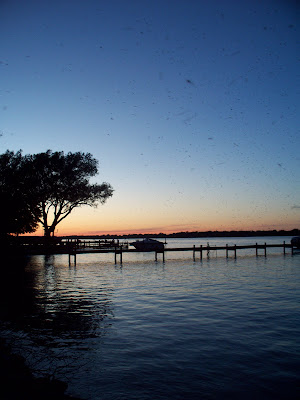The first thing I remember is a blue light.
It seems to come from all around me, but it slowly fades, and I start to see strange glimpses of things that do not seem to be part of this world. I see a wooden horse with strange arc-shaped skids nailed to its legs. No matter what the horse does, it can never move, because, while it may lean forward, the skids will simply rock it back. I see a mirror which is also a door. On the other side hang robes and coats.
I am sitting on a bed, underneath a window. Outside the window it is dark, but I can see roses through the glass.
For some reason I am a boy. I push and prod at my chest, but it is flat. My hair is short. My face is young and full of baby-fat, and when I go to the mirror, I stare into my dark, smudge-like eyes and don’t recognize myself.
I don’t know where I am; only that I woke up in this room under the strange blue-and-yellow blankets printed with images of armored heroes and three-headed animals.
As I stare at myself in the mirror, the face in the mirror grows pensive, chews its lip, shakes its head, stares back at me in sadness. Finally he turns away, and I am left staring at my own reflection’s back, wondering why.
I go back to the bed and lay down on the blankets, dangling my feet over the side of the bed and staring up at the ceiling.
All light fades out, and the ceiling glows with pale blue stars. They expand until they are all around me and there is nothing else to see.
Suddenly I am falling. The blue light grows unbearably bright and I try to close my eyes, but I have no eyelids and no body, I am all eye, and everywhere I see that terrible light until it shrinks down into two horrible pinpoints in a field of total blackness, and those two blue eyes stare at me with a terrible hunger, and I realize how absurdly unlikely my own existence is.
What are the odds of me being born male instead of female? Let's call them fifty-fifty. There was a name picked out in the other eventuality; there was a coin-toss's chance of me being Elizabeth. How odd would that have been?
What are the odds of me being born to affluent white parents in America? Let's say the chance of being born reasonably affluent in America is 1 in 10, and the chance of being born in America in the first place--not the most disadvantaged place to be born--is about 1 in 22.
So, very, very approximately, the odds of me being born into my present social position, about nine-tenths up the ladder in the world's most powerful country (so in the lower rungs of the ladder in the world's most powerful ruling class) is about 1 in 440.
Except that the odds of me being born in the present moment in history are extremely slim. Humans, let's say, have been around in something like their modern form for 6,000-odd years. Within that window, the odds of me being born in the late 20th or early 21st century are something on the order of 1 in 600.
The broadest, vaguest outlines of the life-space I occupy? 1 in 264,000.
That's not even tackling the question of talents, of personality, of mental resources, of physical health--I'm about as healthy as it is reasonably possible to be, and my only physical quirk is moderate nearsightedness, easily corrected with glasses or contact lenses. I am otherwise in disgusting good health and totally free of disfiguration or weakness.
Or the absurdity of me being human at all.
Why human and not some other form of life? Why alive, and not a random agglutination of molecules? Why should there be a me at all?
I won't pretend I haven't thought of this before. It would be sad if this sort of sophomoric realization came to me for the first time at the ripe old age of 24; most people reach this epiphany at 17 or 18, high on their fifty-first joint.
But I can't really get the wild improbability of it out of my mind. Isn't it absurd that I'm me, and not you, or that both of us exist at all? The only reasonable reaction, to my mind, is something like vague nauseated horror.
And then a moment of terror.
What am I me for? What kind of evil plot is this, and what part do I have to play in it, and what fate is waiting for me at the end?
The same old questions, but they make me wake up in strange places some nights.


























